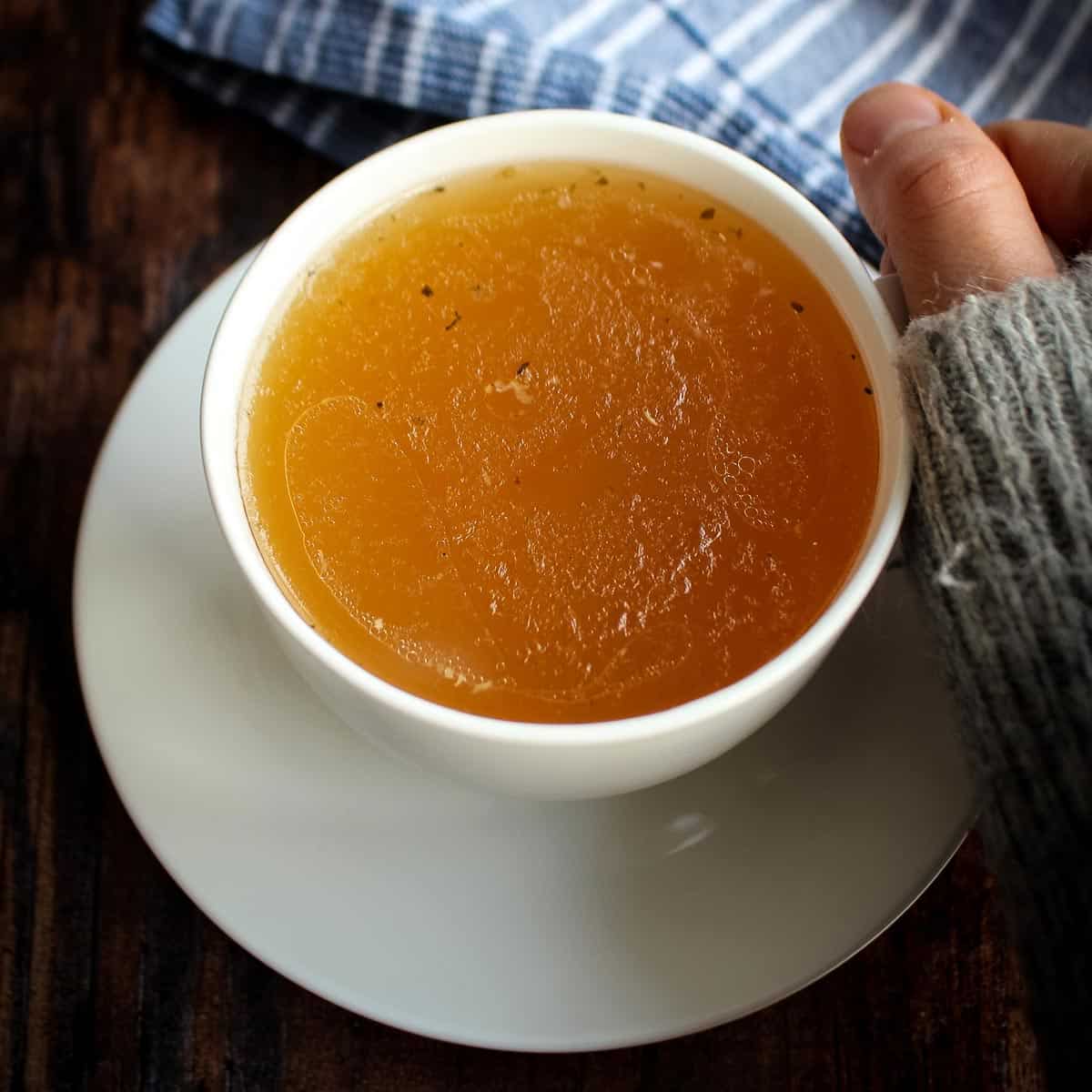The aRelevance of Healthy Food: Why Bone Broth Is a Terrific Option for Infants
When it involves your baby's nourishment, every selection issues. Bone broth stands out as a nutrient-dense option, using essential minerals and vitamins that support development and development. Its rich composition not only aids food digestion yet additionally enhances the body immune system. Understanding how to integrate this versatile food right into your baby's diet can establish the phase for healthy and balanced consuming routines. What are the finest methods to introduce bone broth to your little one?
Nutritional Benefits of Bone Broth for Infants
When you present bone broth to your baby's diet regimen, you're giving a nutrient-dense food that offers numerous wellness advantages. Packed with vital minerals and vitamins, bone broth includes calcium, magnesium, and phosphorus, which support your child's growing bones. It's also abundant in collagen, helping in the development of healthy and balanced skin, joints, and connective cells.
Furthermore, bone broth is an excellent resource of amino acids like glycine and proline, which play a significant role in total growth and muscle advancement. These nutrients help advertise a strong body immune system, setting a solid foundation for your baby's health and wellness.
Additionally, bone broth is easy to absorb, making it a gentle choice for your child. By including this wholesome food into their dishes, you're guaranteeing they get vital nutrients necessary for their general health. So, go in advance and make bone broth a staple in your infant's diet plan!
Exactly How Bone Broth Sustains Digestion
Bone broth is packed with necessary nutrients that can truly profit your baby's digestion. It advertises digestive tract wellness and assists with nutrient absorption, making it a terrific enhancement to their diet plan. By including bone broth, you're setting the stage for a healthier digestion system.
Nutrient-Rich Composition
One of one of the most nutrient-rich foods you can introduce to your infant's diet plan is bone broth, which is loaded with important minerals and amino acids that sustain healthy and balanced digestion. Rich in collagen, bone broth assists enhance your child's gut lining, making it simpler for their body to take in nutrients. It gives gelatin, which aids in breaking down healthy proteins, promoting smoother digestion. In addition, the broth includes crucial electrolytes like potassium and magnesium, ensuring your infant stays hydrated and balanced. The amino acids, such as glycine and proline, play a vital duty in repairing tissues and supporting general health and wellness (chicken bone broth). By incorporating bone broth into your infant's dishes, you're providing them a wholesome food that supports their gastrointestinal system effectively.
Advertises Gut Health
As you introduce bone broth right into your infant's diet plan, you'll locate it not only nourishes however additionally promotes intestine health and wellness efficiently. Rich in jelly, bone broth helps relieve the digestive tract, lowering inflammation and supporting a healthy intestine lining. Furthermore, the amino acids located in bone broth, such as glycine, aid in food digestion and can help stop usual tummy problems.
Aids Nutrient Absorption
Introducing bone broth not just supports intestine health and wellness but also plays a substantial function in aiding nutrient absorption. When you give your baby bone broth, you're providing an abundant resource of minerals and amino acids that boost their digestion processes. The jelly in bone broth helps to soothe the intestine lining, boosting its ability to absorb essential nutrients.
Reinforcing the Immune System With Bone Broth

Additionally, bone broth includes glycosaminoglycans, like glucosamine, that can enhance the immune system's capacity to operate efficiently. This indicates it not only helps in building defenses however likewise aids in recuperation from ailments. By including bone broth right into your infant's diet plan, you're providing a natural resource of nutrients that promotes wellness. So, take into consideration making bone broth a staple in your baby's meals, as it can play an important role in their immune health and advancement.
Easy Ways to Include Bone Broth Into Child's Diet plan
Integrating bone broth into your child's diet can be basic and rewarding. You can also make use of bone broth as a base for soups or stews that you prepare for the family, ensuring your infant obtains a preference of scrumptious, healthy meals.
One more option is to serve bone broth by itself. Cozy it up and offer it in a sippy mug or little dish-- it's a wonderful way to introduce new tastes. If your child takes pleasure in grains, take into consideration my sources cooking rice or quinoa in bone broth instead of water for added nutrition. Lastly, you can ice up bone broth in ice trays, making it simple to include a dice to numerous meals whenever you want. These techniques will certainly aid your baby gain the benefits of bone broth effortlessly!
Homemade vs. Store-Bought Bone Broth: What to Choose
Which is better for your infant: homemade or store-bought bone broth? Homemade bone broth provides you complete control over the ingredients. You can choose top notch bones, natural veggies, and herbs, ensuring your baby gets the most nutrients without ingredients or chemicals. Plus, making it in your home can be a rewarding experience, permitting you to bond with your child while preparing wholesome food.
On the other hand, store-bought alternatives are practical and conserve you time. Nonetheless, they usually contain chemicals and may not match the depth of flavor and nourishment you get from homemade broth. If you select store-bought, search for brands that are natural and devoid of additives.
Inevitably, if you have the time and sources, homemade bone broth is the premium selection for your baby's health and wellness. If you're short on time, choose a top quality store-bought option as a back-up.
Age-Appropriate Bone Broth Serving Tips
As your child expands, it is essential to customize bone broth serving recommendations to their developing stage. For babies around six months, start with a couple of spoonfuls of watered down bone broth. Mix it with water or breast milk to make it much easier for them to digest. As they come to be accustomed to tastes, you can gradually introduce thicker broth by lowering the dilution.
By the time your little one is around a year old, think about supplying bone broth as a standalone beverage or blending it into soups and stews. Just make sure to keep the broth low in salt.
Other Healthy Foods to Combine With Bone Broth for Babies
When you're aiming to enhance the dietary worth of bone broth for your infant, think about matching it with nutrient-dense veggies like carrots and spinach. Entire additional info grain alternatives, such as quinoa or brown rice, can additionally include appearance and fiber. In addition, including healthy and balanced protein resources like shredded chicken or lentils will complete the meal nicely.

Nutrient-Dense Vegetables
Nutrient-dense vegetables are a superb addition to bone broth for babies, enhancing both taste and nutrition. Incorporating veggies like carrots, spinach, and sweet potatoes can boost the nutrient material of your broth. Carrots supply beta-carotene for healthy vision, while spinach is packed with iron and calcium, essential for growth. Sweet potatoes add all-natural sweetness and are rich in fiber, assisting digestion.
You can easily blend these veggies into the broth or serve them as soft, cooked pieces alongside it. This not just presents new flavors but also urges your kid to enjoy a variety of nutrients. By pairing nutrient-dense vegetables with bone broth, you're laying the structure for a healthy and balanced diet right from the start.
Whole Grain Options

Healthy Healthy Protein Resources
Bone broth pairs wonderfully with numerous healthy and balanced protein sources, further enhancing your baby's diet plan. Try including soft, cooked lentils; they're nutrient-dense and packed with protein. You can also mix in shredded chicken or turkey, which are easy for your child to digest. If you're searching for plant-based options, take into consideration mashed tofu or pureed chickpeas-- both give superb protein without overwhelming tastes. Eggs, when presented securely, are an additional terrific selection; they're versatile and loaded with nutrients. Ultimately, mixing in some well-cooked quinoa can include a nice structure and extra healthy protein. By combining these healthy and balanced protein resources with bone broth, you're providing your infant a well balanced, nourishing dish that supports their growth and growth.
Regularly Asked Questions
Can Bone Broth Reason Sensitive Reactions in Newborns?
Yes, bone broth can cause allergic responses in babies, especially if they're delicate to certain ingredients. Always consult your doctor prior to introducing brand-new foods and display for any kind of indications of allergic reactions after feeding.
How Should Bone Broth Be Kept for Babies?
You must store bone broth in closed containers, either in the fridge for approximately a week or in the fridge freezer for as much as three months. organic bone broth. Constantly thaw it correctly before offering to your infant
Is It Safe to Give Bone Broth to Premature Babies?
It's essential to consult your doctor prior to presenting bone broth to early babies. They'll examine your baby's particular health and wellness requirements and assure it's risk-free, considering their unique nutritional requirements and developmental stage. Always focus on experienced suggestions.
What Are the Indicators of Intolerance to Bone Broth in Babies?
When presenting bone broth, watch for signs like fussiness, rash, looseness of the bowels, or throwing up. If your infant reveals any one of these reactions, it's finest over here to seek advice from a doctor before remaining to supply it.
Can Bone Broth Be Made Use Of as a Dish Substitute for Infants?
No, you should not utilize bone broth as a meal replacement for babies. It does not have crucial nutrients needed for their development. Instead, incorporate it right into their diet along with well balanced meals for included nutrients and flavor.